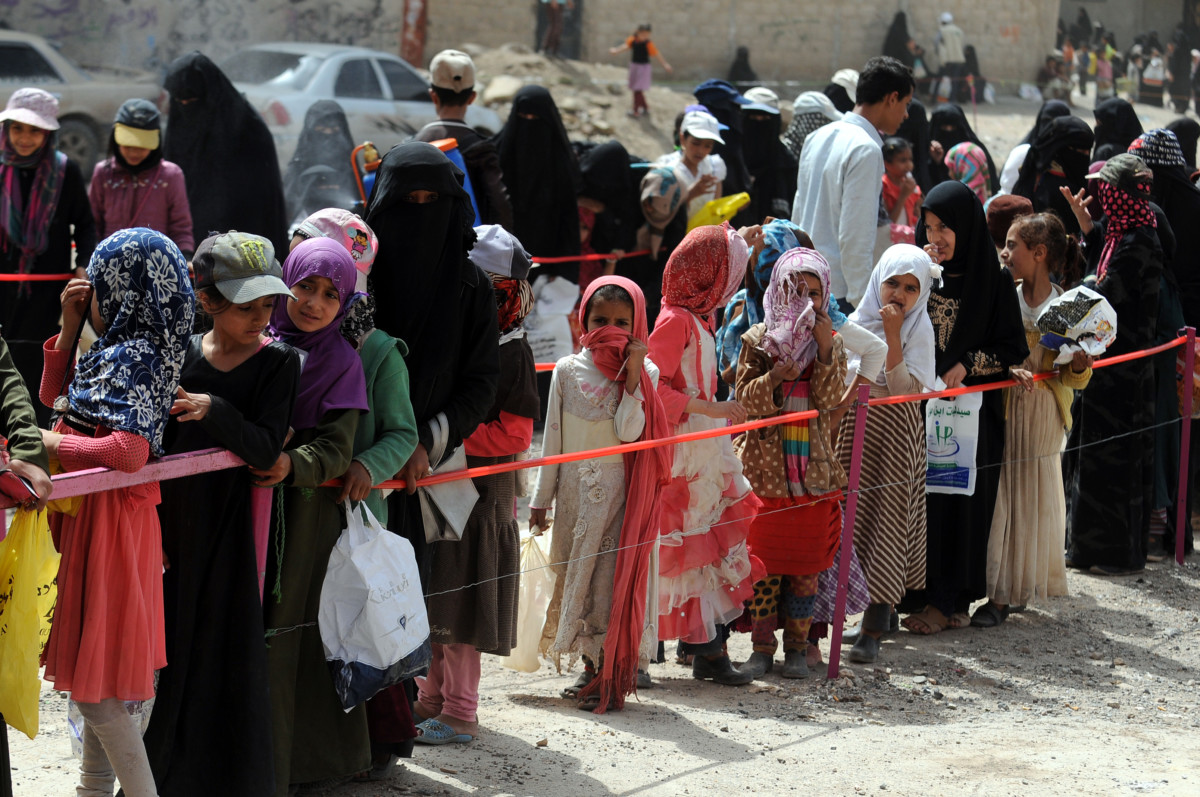Ignoring international aid groups’ warnings that an attack on the Yemeni city of Hodeida, which is held by Houthi rebels, could exacerbate hunger in an impoverished and war-torn nation already on the brink of famine, Saudi-led US-backed coalition forces continued a sweeping assault on the Red Sea port city Saturday, reportedly seizing control of an airport.
Since the fighting started earlier this week, thousands of Hodeida’s 600,000 civilians have evacuated and hundreds of people have been killed. The port city is the main conduit through which about 70 percent of international aid reaches Yemenis, many of whom are battling starvation and outbreaks of infectious diseases such as cholera.
The Norwegian Refugee Council’s office in Yemen told Reuters that “humanitarian agencies cannot currently access areas south of the city where people are most likely to have been injured, affected, and displaced, leaving us without a clear picture of needs.”
“The lack of humanitarian assistance, following suspension of aid programs and with limited NGO staff on the ground while a military offensive is ongoing, will have severe consequences on a region already facing restrictions on the import and internal transportation of vital supplies, including medicines, food, and fuel,” Frederic Pelat, head of Médecins Sans Frontières’ mission in Yemen, warned Thursday. “Yemenis living in the northern parts of the country depend on vital supplies that pass through Hodeida’s port.”
The port of #Hodeida is an essential lifeline for the country: more than 70% of all food, essential medicines and healthcare supplies are brought in through this port. #Yemen@DrTedros pic.twitter.com/lv1HENfWmf
— WHO Yemen (@WHOYemen) June 16, 2018
Martin Griffiths, the UN special envoy to Yemen, arrived in the Houthi-held capital Sana’a on Saturday after the US and UK blocked a UN Security Council resolution that would have called on coalition forces—which are being led by the United Arab Emirates in Hodeida—to immediately implement a ceasefire due to mounting fears that if the coalition takes control of Hodeida, the majority of Yemenis will be cut off from humanitarian assistance.
In an article published by The Intercept on Saturday, former White House and State Department officials, humanitarian leaders, and Yemen experts characterized the coalition’s operation in Hodeida “as a major failure by the US to restrain its coalition partners, who are largely dependent on American weapons, intelligence, and logistical support,” and suggested “the attack was a sign that the US is allowing allies like Saudi Arabia and the UAE to drive American policy decisions in Yemen.”
Kate Kizer, policy director at the DC advocacy group Win Without War, noted that “rather than preventing the offensive, which the US has done twice before, [Secretary of State Mike] Pompeo [released] a weak statement giving the UAE the green light to potentially kill hundreds of thousands of people with no political strategy or end goal.”
“The UAE’s assault on Hodeida is just another example of the Trump administration outsourcing US policy in Yemen—and really the region writ large—to the Gulf states,” Kizer concluded. “Believing that this offensive will bring the Houthis to the negotiating table is living in a fantasyland.”
On Friday, Sens. Bernie Sanders (I-Vt.) and Mike Lee (R-Utah) sent a letter to Defense Secretary James Mattis that acknowledged reports that the US denied the UAE’s request for “intelligence, surveillance, and reconnaissance” support for the Hodeida operation but still demanded answers about the US military’s ongoing assistance to the Saudi-led coalition.
.@SenMikeLee and I call on Sec. Mattis to immediately disclose the full extent of the US military role in the Saudi-led war against Yemen’s Houthis and issue a public declaration opposing the impending assault on Hodeida. https://t.co/jZx5G2Je7i
— Bernie Sanders (@SenSanders) June 15, 2018
The senators wrote,
We call on you to immediately disclose the full extent of the US military role in the Saudi-led war against Yemen’s Houthis, including the use of special operations forces; disclose any role that the Pentagon is currently performing, has been asked to perform, or is considering performing regarding an attack on the port of Hodeida; and issue a public declaration opposing this impending assault and restating the administration’s position that Saudi Arabia and other parties to the conflict should accept an immediate ceasefire and move toward a political settlement to resolve the conflict.
Their letter on Friday followed a similar memo sent last month, which went unanswered, as well as a War Powers Resolution that the pair of senators, along with Sen. Chris Murphy (D-Conn.), introduced earlier this year. While dozens of lawmakers were lauded by peace groups for backing that measure, which would have withdrawn US forces from the war in Yemen, it was ultimately voted down by a majority of the Senate in late March.
In spite of that setback, anti-war advocates continue to push for congressional action to stop US support for the war in Yemen:
Yemen. Can’t. Wait.
Send a message to your Representative to act now to stop it from getting even worse: https://t.co/D9xKU0PwWt https://t.co/gRbdGg5OLA
— CODEPINK (@codepink) June 16, 2018
Join us in defending the truth before it’s too late
The future of independent journalism is uncertain, and the consequences of losing it are too grave to ignore. We have hours left to raise the $12,0000 still needed to ensure Truthout remains safe, strong, and free. Every dollar raised goes directly toward the costs of producing news you can trust.
Please give what you can — because by supporting us with a tax-deductible donation, you’re not just preserving a source of news, you’re helping to safeguard what’s left of our democracy.
